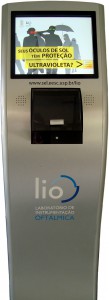Happy sunglasses day!

Not usually the highlight of the year, but sunglasses deserve this day of celebration. Our favourite shades make us instantly photogenic (please see ridiculously cool dog photo on the right) and, most importantly, they protect our eyes from the sun’s ultraviolet (UV) radiation.
Sunlight is Earth’s primary source of energy and UV is just one form of this energy. Too much UV exposure has been associated with many long-term eye issues.
The most well known of these is cataracts; over the years, UV rays damage the lens inside the eye, it becomes cloudy as the proteins unravel and tangle. These cloudy lenses have to be removed surgically. Plus we have short term problems like photokeratitus (AKA snow blindness); where light reflecting from snow and water gives our eyes a super dose of UV causing ‘sunburn’ of the cornea.
We wear sunglasses to prevent these problems, but how do we know our sunglasses really are protecting our eyes?
Not all sunglasses are made equally
When buying sunglasses, the only assurance we have of their UV protection is what’s on the label and this can be as vague as ‘absorbs UV’. Even if your new sunglasses have a reliable safety rating, UV protection can wear off. Just as you need to re-apply sun cream, your sunglasses UV protection can also fade with time. So, how do you know when it’s time to retire your much loved shades?
What can you do about it?

Well, if you’ve been to the University of São Paulo (Brazil) lately you may have heard this little machine trying to grab your attention. A study, published in BioMedical Engineering OnLine, recently unveiled a self-service machine to test the UV protection of the public’s sunglasses.
Author Professor Liliane Ventura explained “Currently, in order to determine the degree of UV protection of sunglasses, a wearer must consult a professional who is able to perform spectrophotometry and who is aware of the standards for sunglasses. Though sunglasses might be sold with UV protection certification, sometimes their effectiveness can change over time. Additionally, certification is not standardized worldwide, though sunglasses are distributed worldwide.
“This equipment offers a means of assuring the public that their sunglasses are providing adequate protection. The kiosks not only provide this information, but also educate the public.”
“Seus óculos de sol têm proteção ultravioleta? Vê-los aqui!”
To find out how well their sunglasses work, users simply place their sunglasses in the kiosk, and the machine performs a transmittance test to find out how much UV radiation the lenses allow to pass through. The kiosk was installed on the campus for the public to use free of charge. Of 800 users of the prototype, 20% found their sunglasses were not giving them adequate protection.
The authors hope to roll the kiosks out in large public places such as malls and beaches, stating that “the easiest and most comprehensive way to protect a population against harm to human health is to provide the public a simple and accessible means of learning how to protect themselves.”
It’s unlikely your local shop will be installing one of these anytime soon, so until then, here are some top tips for picking your sunglasses:
- Look for sunglasses that block 99% or 100% of all UV light. UV absorption up to 400nm is equal to 100% UV absorption
- Lens color and degree of darkness provide no indication of UV protection
- Larger frames, wraparound and closer fitting styles provide better protection from stray light
- A higher price tag doesn’t guarantee quality. Cheaper sunglasses can offer superior eye protection over expensive counterparts
- Polarized lenses help cut glare, but do not add sun protection
- If your sunglasses are old, ask your optician to test their UV protection.
Wish we knew if there are any kiosks in the U.S. I doubt it with the profitability of cataract surgery.
It’s going to let through more than 98% of the visible spectrum, so unless it is a UV laser, your eyes will fry just as quickly wearing the sunglasses as not.